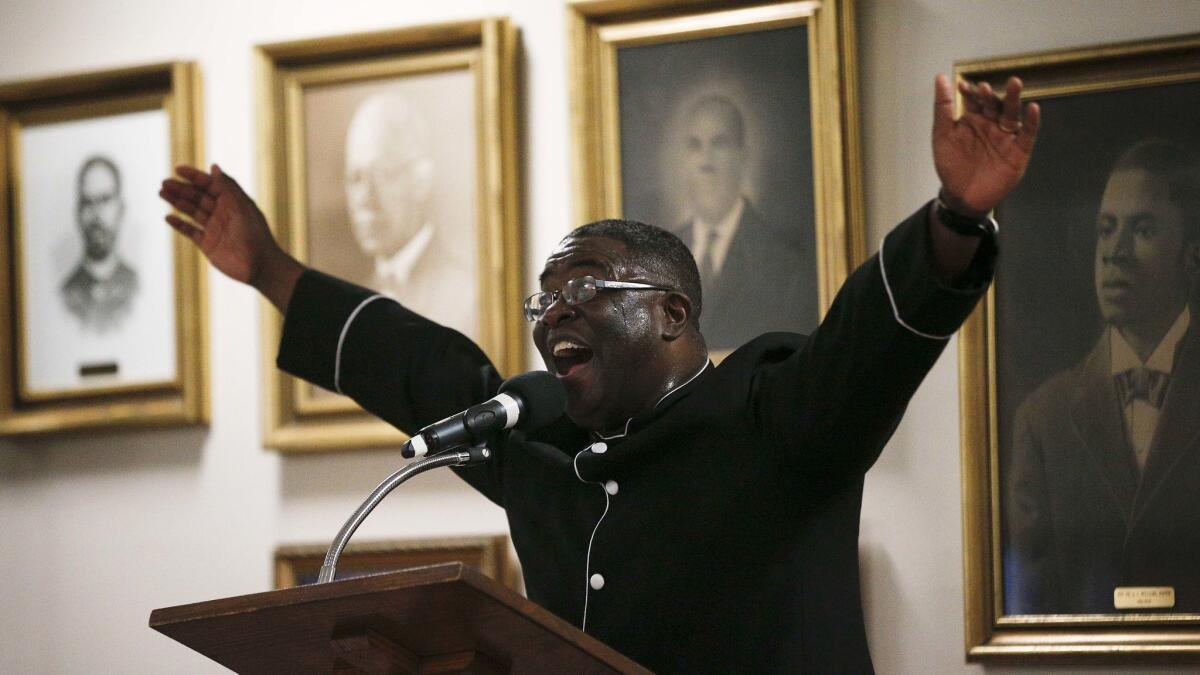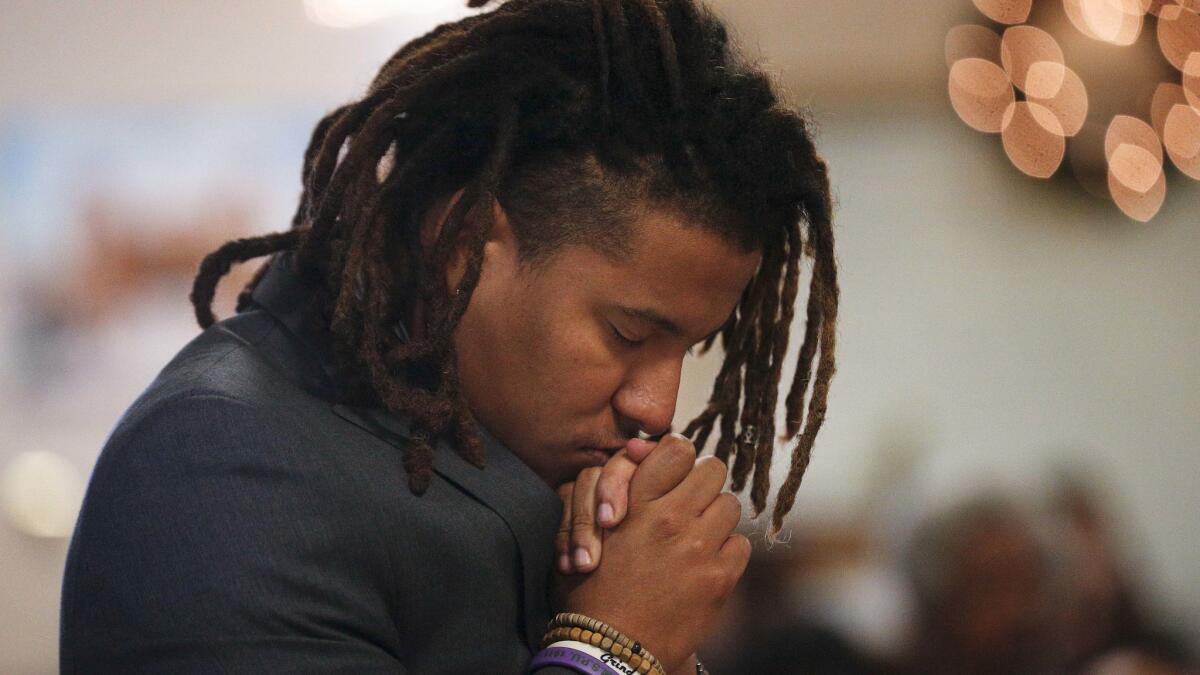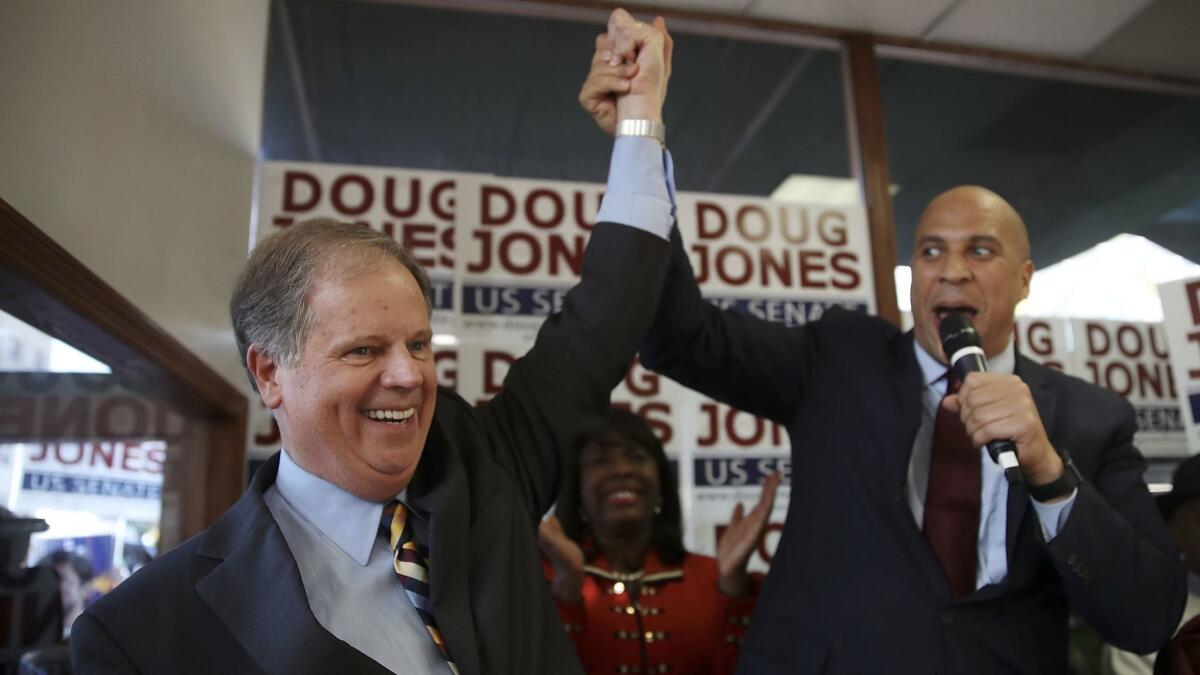Black voters are key to Democratic hopes in Alabama’s Senate race. Will they turn out?

- Share via
Reporting from Birmingham, Ala. — Two minutes into Sunday’s invocation, after blessing the sunshine and recent snowfall and its swift melting, the pastor turned to the political contest that has riveted the nation’s attention on the Deep South.
He asked the Lord to lift up the country, from the White House to City Hall, and asked for deliverance of a new U.S. senator for Alabama who “will suit us best and is the one that will meet our needs.”
The minister, the Rev. Arthur Price Jr., didn’t say who he had in mind. But speaking to a predominantly black congregation in the basement of Birmingham’s historic 16th Street Baptist Church, he didn’t have to.
Doug Jones, the Democratic candidate in Tuesday’s special election, is sure to carry the African American vote in a landslide. To have any shot at winning, however, he needs a robust black turnout to help offset the strong support Republican Roy Moore can expect from Alabama’s mostly conservative white electorate.
Charges of sexual misconduct by Moore have turned what should have been a GOP romp into a fiercely competitive race and the campaign into a gothic narrative of lust and recrimination.
In the final hours, though, it was the practical matter of getting voters to the polls that mainly consumed both candidates.
Moore, who has largely gone into hiding since being accused of molesting two teenagers and romantically pursuing other young girls as an adult, relied on a robocall from President Trump and surrogates attacking Jones as a pawn of liberal Democrats in Washington.

In an interview broadcast Sunday, he again denied the allegations.
Jones focused on motivating African American voters, the bedrock of the Democratic Party in the South and more than a quarter of Alabama’s population.
Here, as elsewhere, they have shown less inclination to vote when Barack Obama is not on the ballot. But there are reasons, Democrats hope, for greater enthusiasm Tuesday: deep animosity toward the president, and the personal histories of the two candidates.
Moore has a long trail of racially provocative words and deeds, and for some African Americans, already inclined to vote Democratic, that offers all the more incentive to turn out.
“He only cares about people like himself,” said churchgoer Joyce Holloway, 65, who has tried to impress upon her nieces, nephews and black co-workers the importance of Tuesday’s vote. “He doesn’t have any concern for people of different nationalities or different races.”
Over the weekend, Jones blitzed through black churches and neighborhoods with an entourage of African American leaders.
On Saturday, it was Selma, where marchers led by the Rev. Martin Luther King Jr. were brutalized in 1965 as they crossed the Edmund Pettus Bridge in a bid to secure black voting rights.
“I’m here to try to get some folks woke,” said New Jersey’s African American senator, Cory Booker, who campaigned along with Massachusetts’ black former governor, Deval Patrick.
On Sunday, Booker joined Jones for a second day, addressing workers at a crowded campaign office in downtown Birmingham and calling Tuesday’s vote, with no shortage of drama, “One of the most consequential races in this nation in my lifetime.”
In a further boost, former President Obama and his vice president, Joe Biden, recorded robocalls on the Democrat’s behalf.
“This one’s serious. You can’t sit it out,” Obama said in the call, first reported Monday by CNN. “Doug Jones is a fighter for equality, for progress. Doug will be our champion for justice. So get out and vote, Alabama.”
Jones, 63, and Moore, 70, are vying to fill the seat vacated by Atty. Gen. Jeff Sessions and held, for now, by Republican Luther Strange, who lost to Moore in September’s GOP primary.
Jones is greatly esteemed in the African American community. As a U.S. attorney, he successfully prosecuted two Ku Klux Klansmen decades after the 1963 bombing of the 16th Street church, which killed four girls in one of the most infamous attacks of the civil rights movement. He is celebrated in a display across the street at the Birmingham Civil Rights Institute.

But the odd timing of the election and the atrophy of Alabama’s Democratic Party — which hasn’t won a major statewide race in over a decade — has some fretting Jones’ jury-rigged get-out-the-vote drive, a combination of campaign and volunteer efforts, may be too little too late.
They complain Jones has stinted on issue-oriented advertising aimed at black voters, focusing too much on potential crossover Republicans who may be put off by Moore’s alleged misconduct and feud with the GOP establishment.
Faya Toure is a longtime Selma voting rights activist and coordinator of Vote or Die, an independent group working on Jones’ behalf.
“It’s not enough to say he prosecuted Klansmen,” Toure said. “That’s a very honorable and courageous thing he did, but that was 30-some years ago. People want to know what are you going to do for me now?”
Jones also drew criticism for a recent mailer picturing a young African American with eyebrow cocked and text reading, “Think if a black man went after high school girls anyone would make him a senator?”
The unstated, though obvious, reference to Moore struck some as offensive and off-key. “Maybe we could’ve used a little bit different language,” Jones said in a SiriusXM interview, but he stuck by the mailer’s essence. “I think it speaks for itself.”
Another factor that could determine black turnout is, inevitably, Trump.
Democratic participation has surged in races across the country this year — even in elections they lost — and Jones is counting on the pattern holding true again Tuesday.
Fred Hutchinson suggested Trump was the reason he sat Sunday morning on a metal folding chair in the 16th Street church basement, a temporary sanctuary while renovations were underway upstairs.
Hutchinson works in the public schools outside Washington and knows Diane Braddock, a former principal, whose 14-year-old sister, Carole Robertson, died in the 1963 bombing.
“Over the last couple of years politics in this country has taken a decided turn for the worse,” said Hutchinson, 63, who flew down to Birmingham for the weekend with two friends to telephone prospective Jones voters and urge them to the polls.
“That requires people to put in a little more effort than they might’ve before, if we’re going to put the brakes on things.”
At the lectern, Price invoked the civil rights movement, the church’s tragic history, the lives lost, the tears and sweat and blood shed to secure a voice for black people at the ballot box.
“We dare not stay home,” he said.
“We must make sure we get out the vote on Tuesday,” he said. “Amen?”
“Amen,” the worshipers responded.
Barabak reported from Birmingham, Ala., and Finnegan from Los Angeles.
Twitter: @markzbarabak
Twitter: @finneganLAT
ALSO
In Alabama Senate race, Republicans fear losing even if Roy Moore wins
Roy Moore dismisses sexual misconduct allegations as ‘ritual defamation’
Spread the swamp? Trump wants some offices moved out of Washington
UPDATES:
10:55 a.m. This article was updated with former Vice President Joe Biden recording a robocall for Jones.
Dec. 11, 7:10 a.m. This article was updated with former President Obama recording a robocall for Democrat Doug Jones.
This article was originally published Dec. 10 at 6:50 p.m.
More to Read
Get the L.A. Times Politics newsletter
Deeply reported insights into legislation, politics and policy from Sacramento, Washington and beyond. In your inbox twice per week.
You may occasionally receive promotional content from the Los Angeles Times.












